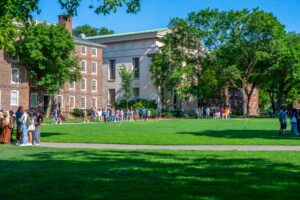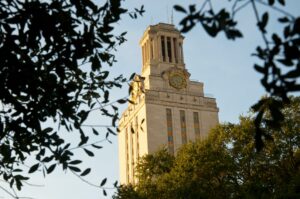College applications have strict deadlines, which loom on the horizon as students enter their senior year of high school. But some of these deadlines are far closer than others; the so-called Early phase of applications. What are these early deadlines? How do they work? Is applying early the right choice for you?
In this article, we’ll go over what early applications mean, what advantages they offer, and when you should consider taking advantage of them. We’ll illustrate this with examples from our previous students, and how they timed their applications strategically to take advantage of how admissions works. Let’s jump right in!
What is Early Decision?
Early Decision (ED) is an application option that gives you a two-to-three times multiplier of being admitted, and contractually commits you to attend that college if you are accepted. All ED applications are binding in this way; thus you should be 100% certain you want to attend a college before applying to it ED. The ED deadline is always before regular decisions come due, and typically falls in early November. ED results also come out earlier, typically released in early December.
Universities share a list of students that have applied ED, so it is not possible for you to apply to more than one school for ED. Students who do so will be rejected by all of the universities they applied to in such a manner, due to the inherent dishonesty of doing so.
Universities increasingly rely on ED to fill seats in their incoming class, and to be certain of how many students will be attending. Most schools admit around half of each incoming class through the ED rounds, despite this being a far smaller applicant pool than those applying regular decision.
Due to the major boost in admissions chances, if our students are certain about what school they want to attend, we always recommend they apply to their top school ED. Student P was certain she wanted to attend Rice, so she applied ED; now she’s slated to attend, and is planning on majoring in biology. She’s not alone; we had 7 students get into Rice ED this past year.
Early Decision II
Early Decision II (ED II) is contractually the same as ED, but the multiplier is smaller than ED and the deadline is later, typically in early January. You should note that currently only a handful of schools offer ED II. We have a whole article on whether applying ED II is right for you, go check it out.
Student S was caught between two top schools this admissions cycle, so she decided to apply to one ED, and if that didn’t work, completed her other application to submit to the other ED II. While she unfortunately didn’t get into her ED school, she was admitted to Vanderbilt ED II.
This is a strategy we recommend you emulate if you have several top choice schools. As acceptance rates fall ever lower, taking a balanced application approach is the best way to maximize your chances of attending a top school.
Early Action
Early Action (EA) is a non-binding early application option that has an earlier deadline than regular decision, typically in early November. A few schools do have EA deadlines in mid-October and mid-November, so check carefully when applying.
While EA does not offer a significant advantage for admissions, you will hear back from colleges sooner than students who apply Regular Decision. Students who apply EA will hear back from schools by mid-December. This is an attractive option for students who want to finish with the stress of college admissions early.
Some colleges don’t offer ED admissions, only EA; so if they are your top choice we recommend applying to EA schools only; so you aren’t locked out of attending your top choice school if you are admitted. MIT is notable here. Last admissions cycle we had a student interested in engineering apply to MIT and several other schools EA, but nowhere ED, because MIT was their top choice. He got in, and is now preparing for his engineering journey.
Restrictive Early Action
Restrictive Early Action (REA), also called Single-Choice Early Action (SCEA), is a halfway step between ED and RD. It’s a non-binding application option that improves your chances of getting admitted to a college, but requires that you sign an agreement stating that you will not apply to any other private schools early. Should you be accepted to a university REA, you are not contractually obligated to ultimately attend the school. REA improves chances more than EA.
Students accepted REA from a university typically have until May to commit to the school for attendance. Notable among REA schools is Harvard. This past admissions cycle, Student M applied to Harvard REA, and several public schools EA. She was admitted by Harvard however, and is now preparing for a major in political science.
Regular Decision
This is the regular round of decisions, which are due in late December or early January. Most students apply RD, and many of our students do as well. Applying early does improve your chances (see below), but that doesn’t make it guaranteed. Even if you complete applications for both ED and EA schools, we recommend not stopping your college application activities, in case things go against you.
Whether you decide to apply to a school Early Decision, Restrictive Early Action, or Regular Decision can have a big impact on your chances of being accepted. Consider the table below, for instance, which illustrates the acceptance rate for ED vs. RD at some top schools for the class of 2023. Note that not all top schools offer ED. These results are from the past year, and the trends hold true.
| School | Admit | Applied | Admitted ED/REA % | Admitted RD % |
| Brown ED | 769 | 4,230 | 18.18 | 6.6 |
| Columbia ED | 650 | 4,461 | 14.57 | 5.14 |
| Cornell ED | 1,395 | 6,159 | 22.65 | 10.55 |
| Dartmouth ED | 574 | 2,474 | 23.20 | 7.93 |
| Harvard REA | 935 | 6,958 | 13.44 | 4.50 |
| Penn ED | 1,279 | 7,110 | 17.99 | 7.44 |
| Princeton REA | 743 | 5,335 | 13.93 | 5.78 |
| Yale REA | 794 | 6,020 | 13.19 | 5.91 |
As you can see, applying ED drastically increases your chances of getting accepted, while applying REA offers a smaller boost. You should know that just applying EA does not offer much of a boost to your chances of acceptance.
Why Does ED Boost Your Chances?
When you apply to a school ED, you make a binding commitment to attend; that’s why you can only choose one school to apply to ED. This signals a high level of interest in the school, and guaranteeing your attendance help’s a school’s yield. The yield is the percentage of admitted students who go on to matriculate at the school, and is used for calculating US News rankings.
In this way, applying ED is the greatest form of demonstrating your interest in a school, even for schools which officially don’t consider demonstrated interest. This is the reason EA doesn’t do much to boost your chances; while it does indicate some interest in the school, it doesn’t lock you into attending.
This locked-in nature doesn’t just demonstrate your interest to the university, but makes things easier logistically for them as well. Schools sometimes find themselves admitting too many or too few students, as they choose to attend any one of the schools on their list that accepted them. If a university knows they have a solid core of students committed to attend, that makes planning much easier for them.
Further, the pool of EA applicants is often more competitive than the pool of RD applicants. Recruited athletes all apply EA, and are given preferential treatment in the admissions process. This is why average scores of admitted students sometimes appear lower in EA rounds. The rest of the EA admissions pool is composed of students who are organized and committed enough to get their applications in early; that is to say, good students.
We aren’t trying to say that you shouldn’t apply EA, or that doing so will hurt your chances. Simply that applying EA doesn’t offer much of a boost, if any, to your admissions chances. That said, being able to finish most, if not all, of your applications by November is a wonderful thing.
Final Thoughts
College applications are always stressful, and this is only increased by the opaque language which colleges employ. We hope that by defining these terms, you will be better able to approach your college applications strategically (for more on that, see our article on application strategy).
Of course, trying to complete college applications while juggling a busy schedule of high school courses isn’t easy. If you want to learn how we can help you manage your applications this fall, schedule a free consultation today. We have a depth of experience helping students, and are always happy to hear from you.








